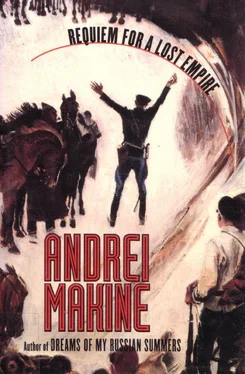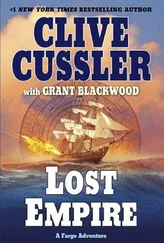Mesmerized by this unknown language, the child falls asleep and hears neither the distant gunshots, multiplied by echoes, nor the long-drawn-out cry that just reaches them, laden with all the despair of love.
Had it not been for you, I would have left behind forever that infant falling asleep in the heart of the Caucasian forest, as we often abandon and forget irretrievable fragments of ourselves that we judge too remote, too painful, or simply too difficult to acknowledge. But one night you made a remark about the truth of our lives. I must have misunderstood you. I was certainly mistaken about what you meant. Yet it was this misapprehension that caused the forgotten child to be reborn in me.
Later on I attributed my confusion to the stress of all the dangers, long-term and immediate, that made up our existence at that time. To our wanderings from country to country, from language to language, to all the masks that our profession imposed on us. And, still more, to that love we superstitiously refused to name, myself knowing it to be unmerited, you believing it had already been declared in instants of silence in cities at war, where we might well have died without ever experiencing such moments at the end of the fighting that restored us to ourselves.
"One day it must be possible to tell the truth…" These were the words, uttered with a mixture of insistence and resigned bitterness, that misled me. I pictured a witness-myself! Confused, lost for words, stunned by the enormity of the task. To tell the truth about that age whose course our own lives had here and there stumblingly followed. To testify to the history of a country, our country, that had succeeded, almost in front of our eyes, in building itself up into a formidable empire, only to collapse in a cacophony of shattered lives.
"To tell the truth one day." You were silent, half lying beside me, your face turned toward the rapidly maturing night outside the window. The netting of the mosquito screen could clearly be seen against the hot, dark background. And in the middle of this dusty rectangle a zigzag tear was becoming more and more visible: the blast from one of the last shells had cut into this fabric that separated us from the city and its death throes.
"To tell the truth…" I did not dare object. Uneasy at the role of witness or judge you were assigning to me, I mentally ran through all the reasons that made me incapable or even unworthy of such a mission. Our age, I told myself, was already receding and leaving us on the shore of time, like fish trapped by the ebbing of the sea. Bearing witness to what we had lived through would have meant speaking of a vanished ocean, evoking its ground swells and the victims of its storms, while faced with impassive undulations of sand. Yes, preaching in the desert. And our native land, that crushing empire, that Tower of Babel cemented together by dreams and blood, was it not disintegrating, story by story, vault by vault, its glass-lined halls turning into batteries of funhouse mirrors, its vistas into dead ends?
The weariness of sleepless nights gave substance to these words. I saw the desert and the tiny puddles of water sucked in by the sand, the colossal ruined tower, drowning in long red banners, a liquid red, a whole river of purple.
You slipped off the bed. I woke up, ready, when suddenly awakened, as for many years now, to abandon our current dwelling, to reach for a gun, to reply calmly to anyone who might be hammering at the door. This time the reflex was unnecessary. The silence of the city was broken only by occasional uncoordinated shots, and a brief rumble of trucks, swallowed up at once by the density of the night.
You went over to the table. In the darkness I saw the pale touch of your body, colored by reflected light from a fire at the other end of the street. "To tell the truth…" All my waking energy became focused on this impracticable notion. As I watched you moving through the dark room I resumed my silent refusal.
You speak of truth. But all my own memories have been falsified. Ever since my birth. And I could never bear witness for other people. I don't know their lives and I don't understand them. As a child I never knew how they lived, all these normal people. Their world stopped at the door of our orphanage. When one day I was invited to a birthday party in a normal family-two little girls with long braids, parents brimming with goodwill, all as it should be, jam in little silver-plate dishes, table napkins I didn't dare touch-I thought they were making fun of me and at any minute they were going to admit it and kick me out. I still remember it with morbid gratitude, you see, as if by not dismissing me they had performed an act of superhuman generosity. Just think of it, tolerating this young barbarian with a shaven head and hands nearly blue with cold, sticking out of sleeves that were too short. And to top it all, the son of a disgraced father. So how can you expect me to be an impartial witness?
You switched on a flashlight, I saw your fingers in the narrow beam, the glint of a needle. "To tell the truth about what we have lived through." I raised myself on one elbow, wanting to explain to you that I understood nothing about the age that was already slipping away beneath our feet. And that the whole shambles of it made me think of the innards of the armored vehicle I had seen the day before at the center of the city, when taking refuge from bursts of gunfire. Ripped apart by a rocket, it was still smoking and displayed a complex mixture of dislocated machinery, twisted metal, and lacerated human flesh. The force of the explosion had made this chaos astonishingly homogeneous, almost orderly. The electric cables looked like blood vessels, the dashboard, battered and splashed with blood, was like the brain of a rare creature, a futuristic war beast. And, buried somewhere in this lava of death, the radio, undamaged, blared forth its quavering rallying calls. Such a scene was not new to me. Only the sudden, sharp realization that I did not understand was quite new. Sheltering in my hiding place, I said to myself that these men who were killing one another under a cloudless sky lived in a land where epidemics were palpably more efficient at this than armaments; that the cost of one rocket would have sufficed to feed a whole village in this African country; that the money spent on that vehicle would have funded the sinking of hundreds of wells; that the blame for this war must be laid at the door of the Americans and ourselves, for we were fighting each other through intermediary nations, and also of the former colonial powers, who had corrupted the Eden-like state of these lands. But that primitive paradise was a myth, too, for men had always fought, with lances in the past, with rocket launchers today; and the only thing to distinguish the deaths of the occupants of the burned-out armored car from the carnage of their ancestors was the complex fashion in which their deaths, deaths both so individual (beneath a layer of torn-off armor I saw a long, very slender, almost boyish arm with a fine leather bracelet on the wrist) and so anonymous, were swallowed up by the interests of remote powers, their thirst for oil or gold, the cut and thrust of their bureaucratic diplomacy, their demagogic doctrines. And even by the petty concerns and anticipated pleasures of that arms dealer I had seen, two days before the fighting broke out, getting onto the plane for London. He had given his name as Ron Scalper and seemed like a very ordinary sales representative. He sought to accentuate his ordinariness by handing over his briefcase to security with a tourist's naive clumsiness, mopping his brow in front of the person checking his passport. Yes, that soldier's death was insidiously linked to the relief this man feels once he is seated in the plane, turning up the ventilation control and closing his eyes, already transported into the antechamber of the civilized world. By the same tortuous routes, that wrist, with its leather bracelet, reaches out into the life of the woman whom the man on the London plane can already picture, offering herself naked, yielding to his desire, the young mistress he has earned for himself by taking all those risks. Our age, I thought, is nothing more than a monstrous organism that digests gold, oil, politics, and wars, and secretes pleasure for some, death for others. A gigantic stomach that churns up and blends together things that, in our shame and hypocrisy, we keep separate. The young mistress, at this very moment moaning beneath her arms dealer, would utter a cry of indignation if I told her her happiness (for, no doubt, they call it happiness) is inseparably linked to that childish bracelet stained with grease and blood!
Читать дальше










